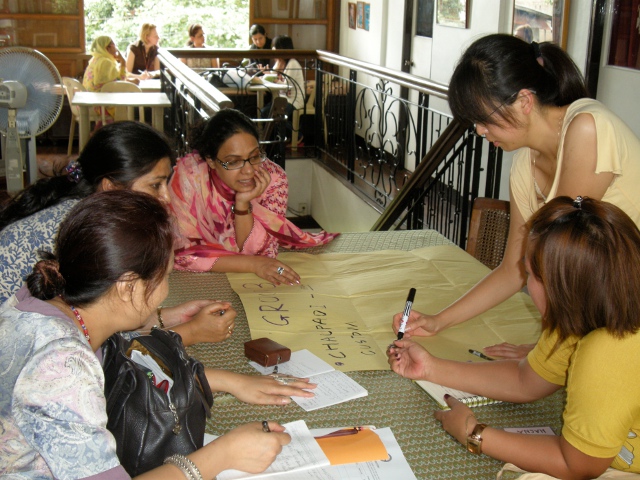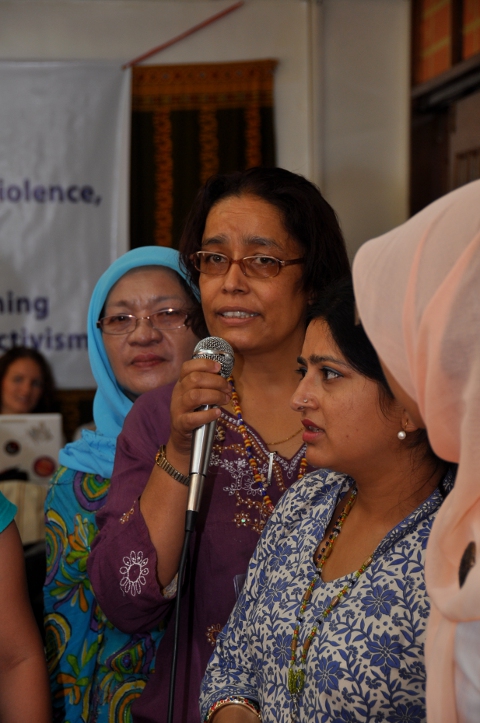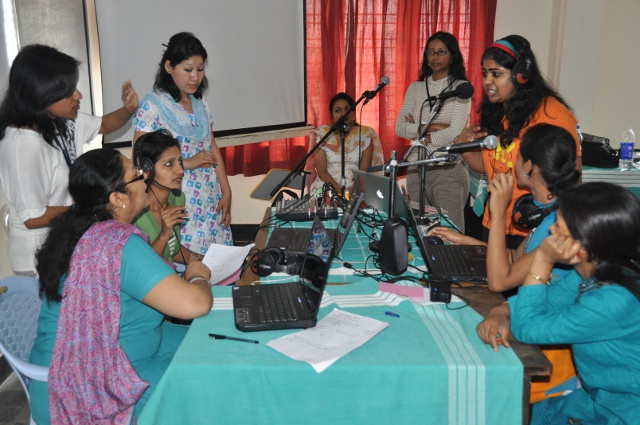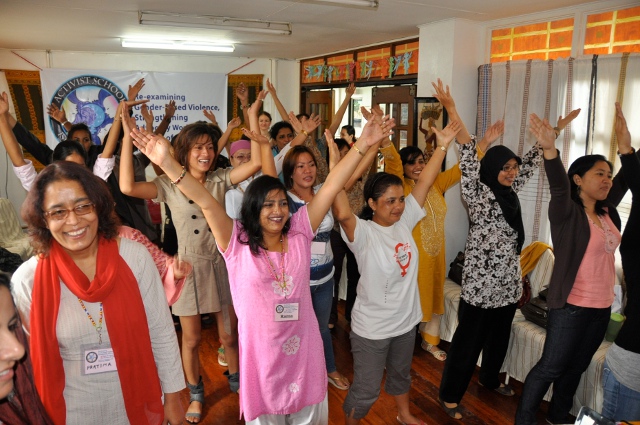“Empowering and exciting”
“I will take these advocacy tools back to my community”
Isis International Activist School participants
The Isis International Feminist Activist Schools, launched in 2010, provide training for women from countries across the global south in using communications for their advocacy work. The Schools last from a few days to a few weeks and are developed in partnership with the groups and organisations requesting the training. The Activist Schools work with the participants to build understanding of the issues, provide technical training on the use of media and communication, and enhance skills to craft messages for advocacy work.
The Schools have had transformative effects on the women, and the response of the participants is enthusiastic. The training provided them an opportunity to engage with other women activists in a women-friendly environment. For many the Schools were their first international training experience and an opportunity to meet and share with other activists whom they most likely would have not met otherwise The participants have been able to put their learning and skills to immediate use in their own organisations and communities. in a women-friendly environment.
Themes of the Activist Schools
The first five Activist Schools in 2010 and 2011 were:
Media Advocacy for Migrant Rights and Empowerment (2010), held at the Isis International House in Manila. Participants were activists, grassroots women leaders and development practitioners from China and the Philippines. For a generally silent group such as migrant workers, alternative media are key tools for the spreading of information and for the assertion of their rights, as well as to deal with government agencies.
Engendering Climate Justice: The Southeast Asia Experience (2010), held at the Isis International House in Manila. This training dealt with climate change issues where women’s points of view are usually not taken into consideration, its impact on women and the responses and discussions around climate change. Participants were grassroots women leaders from the Philippines, Indonesia, Cambodia and Nepal. In this three-day workshop, that culminated with “People's Communications for Engendering Climate Justice: A Dialogue and Festival of Responses”, the participants learned about alternative media and communication tools for advocacy, but also about the relevance of applying a feminist analysis to climate change and the interventions at different levels.
Crafting Messages for Women and Peacebuilding (2010), held in Davao City, Mindanao, Philippines. This Activist School was based on the fact that women, far from being mere victims of conflicts and wars as it is often assumed, have an active role in their resolution, peace-making and peacebuilding. It aimed to strengthen women's communication skills and raise their awareness of the Resolution on Women, Peace and Security (UNSCR 1325) passed by United Nations Security Council in 2000 as a tool for advocacy. During the workshop the participants explored the transformative potential of communication tools -- theatre, radio and visual arts -- to communicate their experiences and their roles in peacebuilding effectively. On the last day a multi-stakeholder dialogue took place -- Development Communications for Holistic and Sustainable Peace -- where women could share the messages and narratives they created during the workshop, emphasizing the importance of values of participation, equality and democracy as tools for peacebuilding.
Re–examining Gender Based Violence and Strengthening Advocacy Work (2010), held at the Isis International House in Manila. This three week Activist School gave participants from the Asia-Pacific region the chance to: learn and exchange on gender based violence (GBV) within a multi-cultural setting; explore new perspectives and frameworks; visit organisations and learn about existing and emerging practices in addressing GBV; share organisational development strategies to strengthen institutional practice; understand the role of feminist development communications in sharpening advocacy for GBV; and be trained in the use of key development communication tools for advocacy and campaigns for the 16 Days of Activism and beyond. Back in their home countries, the participants carried out innovative and locally appropriate campaigns against gender-based violence. Videos of the women talking about these initiatives can be found on the Isis International Facebook timeline of 2010.
Young Feminist Activist Leadership (2011), held at the Isis International House in Manila. Strengthening Young Women’s Leadership, Advocacy and Movement Building was a five-day training to learn about strengthening young women’s leadership, advocacy and movement building in anticipation of the 55th UN Commission on the Status of Women (UNCSW 55). Fourteen young women leaders working on the issues of sexuality and lesbian, gay, bisexual and transgender (LGBT) gender-based violence, women with disabilities, women’s political participation and peace building, and other women’s human rights issues attended this training. These young women came from seven countries within Asia: Cambodia, China, India, Indonesia, Kyrgystan, Philippines and Sri Lanka.
The workshop began by creating a positive space -- emphasising inclusivity and an open heart and mind that would help them with their learning and sharing. Feminist journalism, interviewing techniques, as well as feminist development communication theories were also part of this training. These sessions were followed by hands-on workshops on audio production and editing for podcasts, as well as video production for advocacy. The practical skills were built upon through an in depth discussion about the possibilities and limitations of social media for feminist advocacy, exploring various social media tools such as Facebook, Twitter, YouTube, and blogging. Towards the end of the workshop, an overview and history of southern feminism and the United Nations Commission on the Status of Women (UN CSW) as a site of historic struggle for women from the Global South was provided.
More Activist Schools in 2012
 In 2012 three more Activist Schools are planned, two of them in Asia and one in Africa:
In 2012 three more Activist Schools are planned, two of them in Asia and one in Africa:
The Citizenship Video Journalism School aims are to enhance knowledge about feminist development communication, provide perspectives about fundamentalism with a feminist political analysis and enhance skills such as shooting, editing and using various formats of video for online distribution- This School will take place in Bangkok, Thailand, in November 2012 and is addressed to women from women’s or social development organizations based in Afghanistan, Egypt, Libya, Iraq or Yemen. At the end of the Activist School, the women will produce short films that will be shown and constructively discussed to enhance learning.
A Human Rights Activist School will be held in the Philippines and focus on peacebuilding.
Training for Trainers on Leadership with LGBT Young Leaders from West Africa (24 to 28 September 2012), in Burkina Faso. This Activist School has been developed in partnership with the Queer African Youth Networking Center (QAYN), formed in 2010 to establish a wide network of support to promote the safety and well-being of lesbians, gays, bisexual, transgender and questioning West African youth.
QAYN aims to create a supportive lesbian-led network for young lesbian leaders to relate to one another, empower them to advance the issues of sexual rights in the sub-region and foster activism so that these young leaders can advocate for a more dignified cultural, socio-economic and political environment. In order to achieve such leadership in West Africa, QAYN has been working for the past two years on a project for an advocacy and leadership training in West Africa.
Isis International Manila joined this exciting initiative, bringing its unique expertise in communication and its very special Southern feminist experiences. Ten participants from francophone African countries are expected. The objectives are first for participants to gain a feminist grounding in issues and politics of body, gender and sexuality and power and change through a sharing of knowledge and experiences. This theoretical part will lead to the core of the training: movement and communications strategies building for social change. An important focus will also be developed on self-care and security as leaders and activists. The overall objective is for participants to produce an action plan that includes monitoring and evaluation to be included and implemented in their respective communities.
Interested in an Activist School? Contact Isis International!
Individuals or organizations interested in having an Isis International Activist School can request one on any of the previous workshop themes or have one specific to their advocacy area and interests. Isis International develops the Activist Schools in partnership with the requesting groups and organisations to meet their specific needs and incorporate their ideas. For more information contact This email address is being protected from spambots. You need JavaScript enabled to view it..
Why Feminist Activist Schools on Communications?
Women’s voices have been traditionally silenced over time and cultures. The androcentrism dominant in the academia and politics considers men and the male point of view as the measure of all the aspects of life and has resulted in the invisibility of women in historical accounts, decision-making processes and participation in the public sphere. But visible or not, women have always had something to say and over history they have put in practice their own strategies to challenge discrimination and to fight for social justice with their own parameters and tools.
In the current globalized and communication era, the use and mastering of the new information and communication technologies (ICTs) and traditional media become essential for women to express their own needs, demands and proposals and to make themselves heard, as well as to strengthen social movements and to weave alliances throughout the world. This is the core of and the aim of the Isis International Activist Schools in the Global South. Isis International has been working within this framework since 1974. Based first in Europe, the organization moved to the Philippines in 1990 to be more accessible to women from the Global South.
Isis International transferred its rich collection of international feminist resource materials and opened a resource center in Manila. The Activist Schools have built on Isis International’s capacity building and training activities over the years. From its early days, Isis International has been a hub of feminist activist capacity building. In recent years it has conducted several capacity building seminars in community radio and ICTs with radio journalists and activists.
Community Radio Workshops
 These workshops include: Women Making Airwaves for Peace carried out in India, with the participation of 28 women community radio broadcasters from South and Central Asia on the topic of engendered peace building. It was designed to equip participants with knowledge of feminist development communications, and to enhance their skills in radio production, digital audio editing and interview techniques. The workshop included sessions on engendered peace journalism, feminist broadcasting and Gender Policy for Community Radio.
These workshops include: Women Making Airwaves for Peace carried out in India, with the participation of 28 women community radio broadcasters from South and Central Asia on the topic of engendered peace building. It was designed to equip participants with knowledge of feminist development communications, and to enhance their skills in radio production, digital audio editing and interview techniques. The workshop included sessions on engendered peace journalism, feminist broadcasting and Gender Policy for Community Radio.
WMAP served as a space where participants shared their experiences and best practices towards engendering peace building, climate justice and disaster mitigation as well as the role of community radio in empowering women in response to these issues. The workshop was conducted in conjunction with the 2nd World Association of Community Radio Broadcasters (AMARC) Asia Pacific Community Radio Conference which was held in Bangalore, India where WMAP participants were in attendance.
Sagada Radio Strategic Planning, Mountain Province, Philippines.
Rainbow Rights Radio Production, Manila, Philippines.
Thateng Ethnic Community Radio for Development, Sekong, Laos.
Isis International also provided training at an AMARC workshop organized for SEWA (Self-employed women’s Association) Community Radio, Management and Advanced Radio Production, Gujarat, India.
People’s Communications for Development
The Schools build on Isis International’s indepth action research on People’s Communications for Development, carried out over three years (2005 - 2008) in five countries (India, Thailand, Philippines, Fiji and Papua New Guinea), in the Asia-Pacific Region and involving some 25 women’s and community groups. This study revealed the communication needs of women’s and social movement organisations on the ground in their work towards empowerment and social justice. The main findings showed that the most effective communication tools for intermediary groups to reach grassroots women’s were radio, theater, film and face-to-face communication. It also identified a demand on the part of women’s groups to converge traditional and new media and ICTs.
This was the decisive point that made Isis International launch the Activist Schools for capacity building in gender, media and communications, shifting the focus towards grassroots women.
These in turn rest on the firm foundation of Isis International’s many years of information and communication work; and its close connections with activists on the ground, those who are working for social justice and change, and in particular for women’s empowerment, in physical, issue-and context based communities that are marginalised by mainstream society.
The Isis International Activist Schools not only highlight the feminist perspective and gender impacts of different issues, but also recognize women’s capacity of agency and aim at strengthen it by providing the tools for them to advocate and to make social change happen. As a feminist professor said, “what women think today is a thought for humanity”, but this thought needs to be broadly expressed, carefully listened to and duly valued.
Isis International is grateful to Mama Cash and the Global Fund for Women for supporting the Activist Schools and to ICCO & Kerk in Actie for supporting our work on peacebuilding, as well as to the other agencies who have supported our work (please see the Isis International Annual Reports for a complete list) and to the many individuals who have contributed to making our work possible.






 The
The 
 Isis Resource Center holds one of the largest feminist collections of materials in the Global South. With 40 years of publication experience, Isis holds a vast collection.
Isis Resource Center holds one of the largest feminist collections of materials in the Global South. With 40 years of publication experience, Isis holds a vast collection.